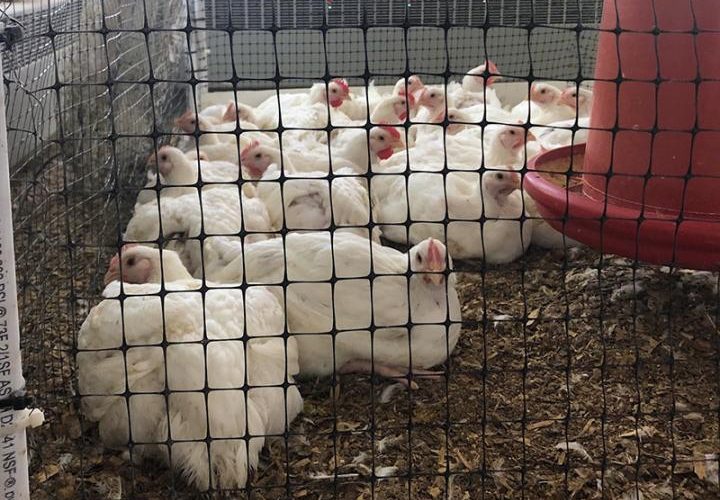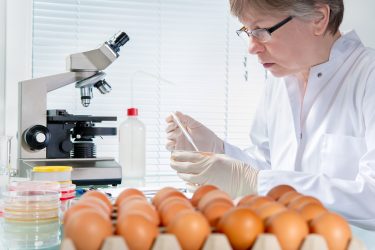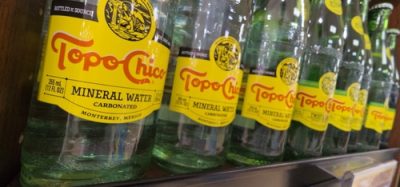Study shows that reusing chicken litter can deter Salmonella
- Like
- Digg
- Del
- Tumblr
- VKontakte
- Buffer
- Love This
- Odnoklassniki
- Meneame
- Blogger
- Amazon
- Yahoo Mail
- Gmail
- AOL
- Newsvine
- HackerNews
- Evernote
- MySpace
- Mail.ru
- Viadeo
- Line
- Comments
- Yummly
- SMS
- Viber
- Telegram
- Subscribe
- Skype
- Facebook Messenger
- Kakao
- LiveJournal
- Yammer
- Edgar
- Fintel
- Mix
- Instapaper
- Copy Link
Posted: 11 June 2020 | Bethan Grylls (New Food) | 1 comment
An experiment with chicken litter samples, often used in broiler environments, could uproot previous hygiene fears as study demonstrates deterrence in pathogen growth.


A study claims that the environment in reused poultry litter can deter growth of pathogens such as Salmonella.
The US produced more than 9.2 billion broiler chickens last year, with consumers spending over $95bn on chicken products, according to the National Chicken Council.
These chickens require millions of tonnes of bedding material and reusing chicken litter for this purpose can save costs. There have, however, been concerns over whether this is hygienic.
“When you read or hear that broiler litter is reused to raise multiple flocks of chickens, the typical reaction is that it must be bad for food safety,” said Adelumola Oladeinde, a co-author of the study and researcher at the USDA’s National Poultry Research Center in Athens. “Our study demonstrates the exact opposite.”
The team discovered that ‘good’ bacteria in used poultry litter can deter Salmonella growth.
“It may be worthwhile to invest time and resources to characterise the bacteria in reused litter. We can develop the promising ones into beneficial microbes for better chicken gut health.”
The study also examined litter characteristics, including moisture and ammonia levels, which can affect the litter microbiome – the mix of bacteria, fungi, and viruses in litter.
“Our findings provide new information on the relationship between the physical environment of broiler litter and its microbiome,” explained Oladeinde. “Management techniques that account for both factors may help reduce Salmonella in chickens.”
According to the researchers, the litter plays a crucial role in broiler health, with chicks often eating the litter before feeding from troughs or drinking. The belief is that microbiome present in the litter likely becomes the ‘first settler’ in the hen’s gut.
“These first microbes play a key role in determining gut health. Therefore, it is critical to determine what a beneficial litter microbiome looks like.”
The team collected samples of reused poultry litter from the University of Georgia Poultry Research Center. These samples were used to raise three flocks of broiler chickens under the same conditions as broiler farms, with each sample representing a unique environment.
In the lab, researchers measured characteristics of the litter samples. Then they added Salmonella to each sample. The samples were then tested for levels of Salmonella, other bacteria, and physical characteristics.
Within two weeks of adding Salmonella, most samples developed predictable microbiomes. Certain microbes, such as Nocardiopsis bacteria, seemed to reduce growth of Salmonella.

Oladeinde explained the reasoning behind this: some species of Nocardiopsis bacteria are known to produce antibiotics and toxins, these compounds could be keeping Salmonella levels low in the litter samples.
A key aspect of reusing broiler litter is how long to wait (known as downtime) before reuse. “For farmers, a shorter downtime will result in growing more birds through the year,” according to Oladeinde. “However, we know little about how downtime affects litter microbiome.”
The study reveals that surveying levels of specific bacteria could help determine if litters have had enough downtime. “We showed that the reused litter after two weeks of downtime had a microbiome that was unfavorable to Salmonella.”
The team is now looking to repeat these experiments with litter from various sources, as well as test for multiple Salmonella strains.
Related topics
Food Safety, Pathogens, Quality analysis & quality control (QA/QC)









And it may optimize the long term farm benefits of using products proven to recover from dysbiosis of birds, flock after flock.